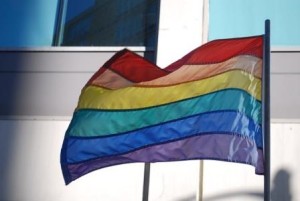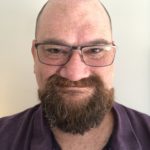- Calls to this hotline are currently being directed to Within Health, Fay or Eating Disorder Solutions
- Representatives are standing by 24/7 to help answer your questions
- All calls are confidential and HIPAA compliant
- There is no obligation or cost to call
- Eating Disorder Hope does not receive any commissions or fees dependent upon which provider you select
- Additional treatment providers are located on our directory or samhsa.gov
Eating Disorders and the LGBTQIA+ Community

Contributor: Andrew Walen, LCSW-C, LICSW, CEDS, Founder and Executive Director of The Body Image Therapy Center
The eating disorders treatment community has a lot to learn about assessment, etiology, and treatment of those who identify LGBTQIA+. Most everyone wants to be an ally in the treatment community, but few know how to effectively do so. It takes a willingness to admit we do not know nearly enough beyond rates of diagnosis and that we must listen, learn and grow as providers so we can better meet their needs.
Eating disorder research has provided little evidence-based practices that describe unique programming for LGBTQIA+ clients. But the obvious practical solution is to start with respect for the inclusive language, fluidity of gender and sexuality, and experiences of neglect and trauma from family or community who may not support them the way they need.
Individual stories break down to issues of self-compassion, self-worth, depression, stigma, and belonging. Case after case in my own program, the client is not interested in recovering from the eating disorder as much as they need to feel loved and accepted for who they are, that their body is their true home, and expresses their genuine identity.
LGBTQIA+ Experiences in Eating Disorder Treatment
A recent research article looked at 84 transgender individuals in treatment for an eating disorder around the country. Not one of them said they had a positive experience in treatment. While that might be an anomaly to literally have zero positive responses, most LGBTQIA+ eating disorder support groups in social media are filled with individuals who report feeling this way.
 Recovery is not a singular focus on nutrition rehab – though it is a major goal, of course! But without empathy for how and why recovery is so much harder and looks so different for cisgender straight individuals, we do not do justice or honor those who do not fit the common mold of the eating disorder client.
Recovery is not a singular focus on nutrition rehab – though it is a major goal, of course! But without empathy for how and why recovery is so much harder and looks so different for cisgender straight individuals, we do not do justice or honor those who do not fit the common mold of the eating disorder client.
And we must recognize that race, religion, socio-economic background, abilities, nationality, and age all play additional roles that influence the unique experience of those who identify LGBTQIA+. We have much to learn. But learning starts with asking good questions and listening intently about what each person needs.
Ultimately, a treatment program provides a home for every “Body.”
 The Body Image Therapy Center in Columbia is a full-service eating disorders treatment program treating both the eating disorder behaviors and underlying causes such as depression, anxiety, trauma, and neglect. Our goal is to help our clients reach full and sustained remission with a comprehensive team approach including therapists, dietitians, and psychiatric and medical services.
The Body Image Therapy Center in Columbia is a full-service eating disorders treatment program treating both the eating disorder behaviors and underlying causes such as depression, anxiety, trauma, and neglect. Our goal is to help our clients reach full and sustained remission with a comprehensive team approach including therapists, dietitians, and psychiatric and medical services.
About the Author:

Andrew Walen, LCSW-C, LICSW, CEDS, is the founder and Executive Director of The Body Image Therapy Center in Maryland, and D.C. He is a Certified Eating Disorder Specialist, psychotherapist, author, speaker, and advocate in the eating disorders field, with expertise in males with eating disorders.
Andrew is the immediate past-President of the National Association for Males with Eating Disorders (NAMED), which merged with the National Eating Disorders Association (NEDA) in November 2019. He currently serves as NEDA’s Senior Advisor on Males with Eating Disorders. He is also a past founding board member of the Binge Eating Disorder Association (BEDA). He has appeared on The Today Show, was featured in The New York Times, USA Today, Men’s Health, and many other national and local media outlets as an expert in the field of eating disorders and body image. In addition, he has authored numerous articles and presented workshops at national and international eating disorder conferences. His book Man Up to Eating Disorders, which is a memoir and self-help book directed at males with eating disorders, was published May 2014.
Andrew is a magna cum laude graduate of the University of Tennessee College of Social Work in Nashville. He also graduated from the Berklee College of Music and is a published singer/songwriter/multi-
The opinions and views of our guest contributors are shared to provide a broad perspective on eating disorders. These are not necessarily the views of Eating Disorder Hope, but an effort to offer a discussion of various issues by different concerned individuals.
We at Eating Disorder Hope understand that eating disorders result from a combination of environmental and genetic factors. If you or a loved one are suffering from an eating disorder, please know that there is hope for you, and seek immediate professional help.
Published April 1, 2021, on EatingDisorderHope.com
Reviewed & Approved on April 1, 2021, by Jacquelyn Ekern MS, LPC

The EatingDisorderHope.com editorial team comprises experienced writers, editors, and medical reviewers specializing in eating disorders, treatment, and mental and behavioral health.

